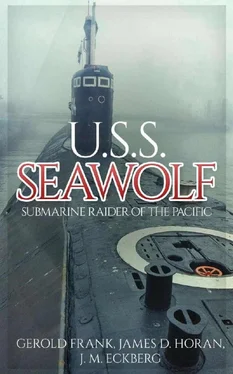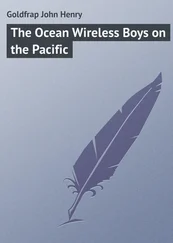Captain Warder said, “Go out and relax.” He kept a skeleton crew aboard—only enough men to carry out essential work—overhauling engines, checking gear, refitting, adjusting. The rest of us broke out our whites, polished our shoes, and, spic and span, jumped into a liberty boat and chugged into dock, more than a mile away. The center of town was about a mile from the dock over a dry, dusty red-clay road. By the time we hiked there we were hot and perspiring and covered with dust. Our feet, accustomed so long to loose sandals, burned and ached. First we wanted ice-cold beer, and then we wanted new faces to see, new voices to hear. We wanted to hear a girl laugh and giggle, and watch the swing of her dress as she walked, and know how wonderful the world could be after days and nights in the cramped, prison-like confines of a submarine.
But we were out of luck. We couldn’t get any beer; apparently the Aussies’ thirst was for milkshakes, ice cream sodas, and similar sickening combinations. We explored for nearly an hour, growing more disgusted with every step. As for companionship, the only white woman we saw and spoke to was a hard-bitten, middle-aged waitress who had troubles of her own.
We took a vote and decided to return to the boat. At least, the Wolf had ice water and coffee. As we neared the ship again on the liberty boat, there was Lieutenant Deragon leaning in the shade of the conning tower, smoking a cigarette and watching a United States transport at anchor not far away.
We bobbed up and down alongside the rounded black sides of the Wolf . Deragon walked to the side and leaned over the heavy cable which serves as a rail. “What are you doing back here?” he demanded.
“Lieutenant,” said Maley, in a hopeless voice, “there’s nothing in port—no beer, no girls, no nothing.”
“No beer?” Deragon said. He thought hard. “Well, I think we ought to be able to do something about that. You boys wait here,” he said. He flipped his cigarette over the rail and hurried off.
We sat around smoking and comparing notes on things. They weren’t complimentary. The sun came down, blazing hot. Not a breath of air anywhere. At the end of that dusty road, the port lay stewing in her own juice—a blistering hot town. Deragon showed up, perspiration rolling down his face.
“O.K.,” he said. “I found a dozen cases of beer. They’re on that transport. They’re sending them over.” He spoke so casually you might have thought he was giving us the time of day instead of a miracle. And while we sat there, our tongues hanging out, a launch came cutting through the water toward the Seawolf , carrying cases of cold beer under a tarpaulin. Beer—so far as the Wolf crew was concerned—meant baseball, and Gunner Bennett dashed down to the gun locker and came back with a seabag full of equipment—half a dozen bats, about a dozen balls and mitts. We found an empty lot, not far from the dock, unpacked our beer and equipment, and it was the engineers against the deck crew, the “Winton Wizards” vs. the “Deck Apes,” with time out between innings to refresh ourselves. At the end of the fourth inning the score was 34 to 31, and no one knew who was leading.
“Aw, nuts,” somebody said, and we called it a day. We finished the beer, packed up our softball equipment, and ambled happily back to the liberty boat and the Wolf .
We were in port several days. Quite a few uniforms paraded up and down the main avenue—Indian, Dutch, American, British. At night a gloom of its own settled upon the whitestone buildings and the hodgepodge of weather-beaten shacks. The Salvation Army had established one of their famous huts on the outskirts, a one-story green frame building. We munched free doughnuts, gulped what the Australians call coffee, and lounged in easy chairs. A middle-aged Australian couple were the staff.
But most of the time we had work to do aboard the Wolf .
Before supper of the last day, Sousa came bellowing through the ship. “All right, sailors, take it easy for a while and eat a good chow. Tonight we’re really going to labor.”
“What are you talking about?” someone asked him. “Work? Work on what?”
“Never mind the comment,” said Sousa. “Do like I’m telling you.”
That night two dim lights were rigged up on the conning tower, and about 8 p.m. a string of motor launches came out of the darkness. They were jammed with boxes of ammunition. We looked at them, swore, and set to work unloading them.
“What the hell,” someone said bitterly, “are we a sub or a transport? Now they’re making a cargo carrier out of us.”
“Yeah,” said Swede Enslin. “Put a smokestack and some lifeboats on us, and we’ll go out disguised as a tramp steamer.”
Jap ships were everywhere, waiting to be sunk, and here we were again, wasting our time acting like a freighter. The crew felt indignant. I think we began to see the light when Captain Warder ordered a number of torpedoes taken out of the Wolf and put on the Holland to make more room for ammunition. If the Skipper went so far as to take off our warheads—well, this job we were doing must be important. We felt better when the word came around that we were carrying this ammunition—anti-aircraft and machine-gun ammunition—to Corregidor, to the Rock. We were going to take this ammunition for our boys right through the Jap blockade, right through every ship and subchaser and destroyer the Japs could put there, and we’d take it to the boys on the Rock so they could hold Corregidor as long as human heart and muscle and skill could hold it. And for the record, too, we’d settle once and for all one of the oldest arguments in sub circles—just how valuable a submarine could be as a cargo carrier. If we got this cargo into the Rock, there’d be practically nothing the Wolf couldn’t do except fly over it.
We packed ammunition until it almost oozed out. We thought the cases would never stop coming down. Ammunition piled higher and higher. It was in the forward torpedo room, the after-torpedo room. We stepped over it and we slept on it. The cases were above the level of my bunk, seven feet above the deck. That night I crawled over cases of shells to get to my bunk. Sleeping on that ammunition gave us a queer feeling. A heavy depth charge, with us packed in explosives like china in excelsior—“Well,” said Maley, summing it up, “if they get us, they’ll just blow us a little higher, that’s all.”
When we finally pulled away, the only torpedoes the Wolf had were those in her tubes, but she carried tons of ammunition.
We slid steadily through the waters north of Australia.
We traveled submerged in daylight and surfaced at night as usual. We were running at periscope depth, taking observations every few minutes, when Sousa’s voice boomed over the intercom: “Call the Captain!”
Captain Warder went flying up into the conning tower. I heard Lieutenant Holden say: “Captain, I see something on the starboard bow. Can’t make it out.”
“Let’s take a look at it, Dick,” said Captain Warder. A thirty-second pause as he peered through the periscope. “She’s pretty far off yet.” Thoughtfully he added: “It could be a ship, all right. Let’s continue as we are. Down periscope.”
Three minutes later he upped the periscope again. He took his bearings, giving them to Lieutenant Holden: “Mark, three four six…” Then, after a minute: “Mark three four seven… That’s pretty steady bearing. She’s coming almost directly toward us, or she’s going directly away from us.” He waited, then: “Mark, three five two. That’s a ship, all right. Coming this way, angle on the bow, five degrees starboard. It’s a big one. Pretty far off yet, but looks like an aircraft carrier.” Pause. “Battle stations!”
Читать дальше






![Hubert Bancroft - The Native Races [of the Pacific states], Volume 5, Primitive History](/books/749157/hubert-bancroft-the-native-races-of-the-pacific-s-thumb.webp)

![Hubert Bancroft - The Native Races [of the Pacific states], Volume 1, Wild Tribes](/books/750126/hubert-bancroft-the-native-races-of-the-pacific-s-thumb.webp)



![Edward Ellis - Adrift on the Pacific - A Boys [sic] Story of the Sea and its Perils](/books/753342/edward-ellis-adrift-on-the-pacific-a-boys-sic-s-thumb.webp)